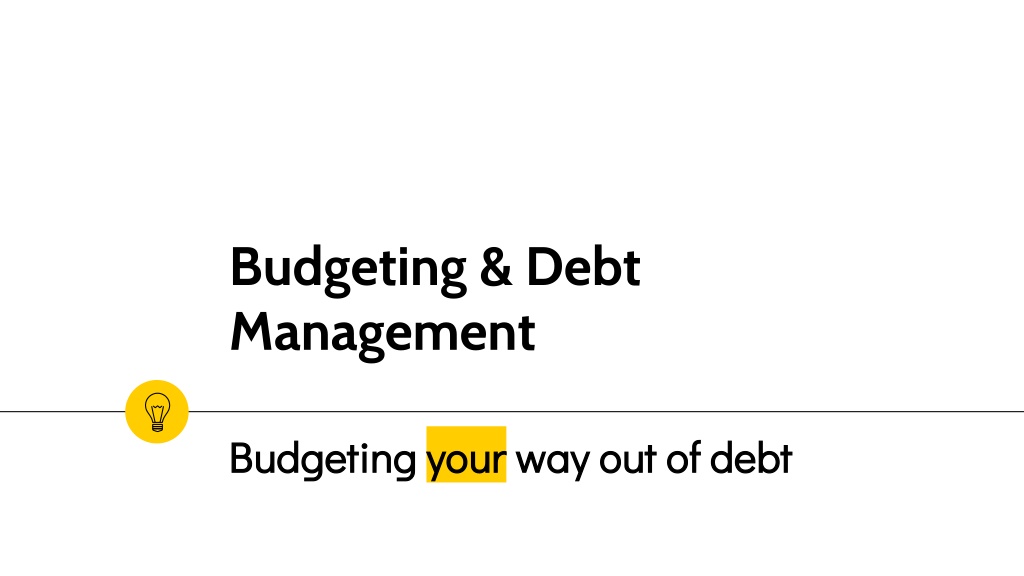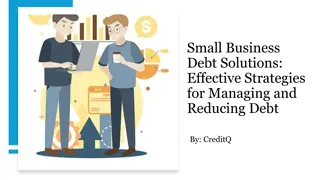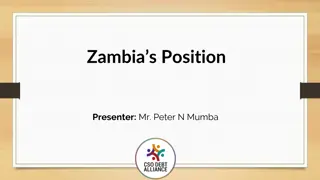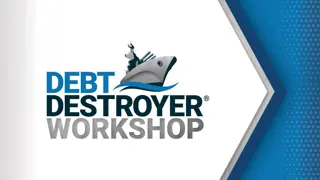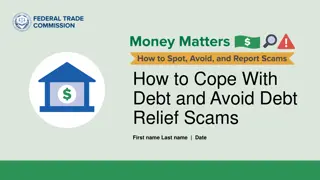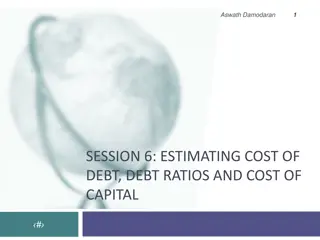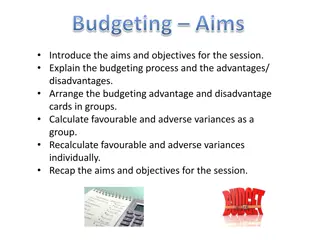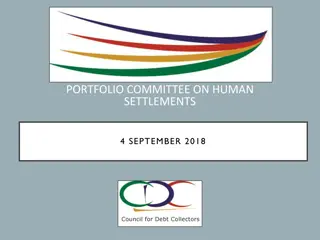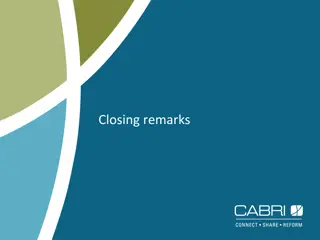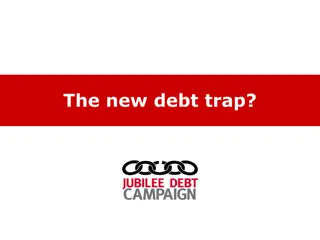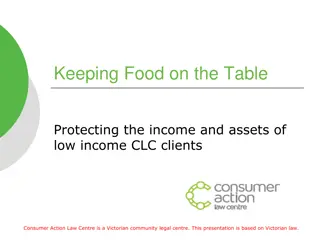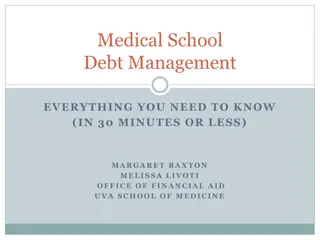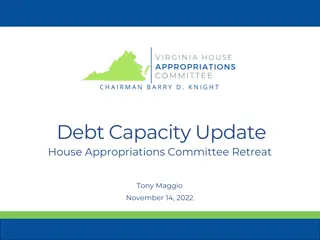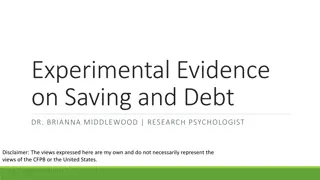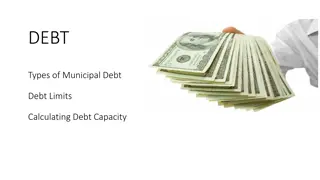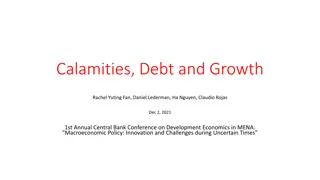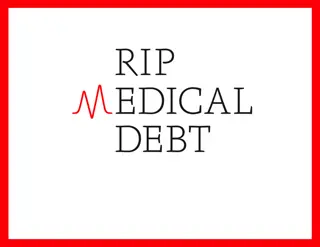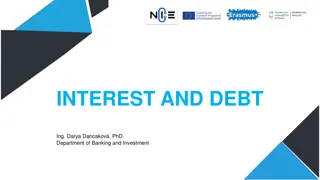Effective Strategies for Budgeting and Debt Management
Explore the importance of budgeting and debt management techniques to pave your way out of debt. Learn about understanding debt, establishing credit, setting up an emergency fund, and preparing for retirement. Discover tips on maximizing employee benefits and creating a comprehensive financial plan for a secure future. Begin building your financial skills and identify your financial goals to achieve financial stability. Take charge of your expenses, prioritize savings, and set up an ideal budget structure to secure your financial well-being.
Download Presentation

Please find below an Image/Link to download the presentation.
The content on the website is provided AS IS for your information and personal use only. It may not be sold, licensed, or shared on other websites without obtaining consent from the author.If you encounter any issues during the download, it is possible that the publisher has removed the file from their server.
You are allowed to download the files provided on this website for personal or commercial use, subject to the condition that they are used lawfully. All files are the property of their respective owners.
The content on the website is provided AS IS for your information and personal use only. It may not be sold, licensed, or shared on other websites without obtaining consent from the author.
E N D
Presentation Transcript
Budgeting & Debt Management Budgeting Budgeting your your way out of debt way out of debt
Agenda Understanding Debt Establishing Credit Setting up an Emergency Fund Protecting Yourself Saving for the Future Maximizing Employee Benefits Preparing for Retirement Budgeting Creating a Plan More information on topics discussed today can be found at www.burkholderteam.com
Hello! We are The Burkholder Team You can find more information at www.burkholderteam.com
Exercise 1 What is most important to You? 1. What are your top three Expenses? 1. 2. 2. 3. 3.
Budgeting Budgets: Why it s important & how to properly use it
The Secret to Getting Ahead is Getting Started. Mark Twain
Building Your Financial Skills Many People Start Out in Debt with Limited Financial Education Today s Goals: Establish Sound Money Habits Identify Your Financial Goals
What You Owe Breakdown of Expenses Fixed: Same price paid monthly/annually Manditory: Needs Variable: Price variable each month/year Discretionary: Wants
Setting Up Your Ideal Budget Living Expenses Housing - 25% Utilities - 5% Insurance - 10% Loans - 5% Transportation-10% Food-10% Personal Care Recreation - 5% Charitable - 5% Savings Minimum of 5% of Gross Pay Goal of 20% of Gross Pay - 5%
Emergency Fund The reason to have an emergency fund is simple: You don t know what s going to happen in life.
What Are Emergency Funds? Defined: A stash of money set aside to cover the financial surprises life throws your way. These unexpected events can be stressful and costly. Top Emergencies People Face: Job loss Medica or dental emergency Unexpected home repairs Car troubles Unplanned travel expenses
Top Questions People Have about Emergency Funds How much should you have saved? In a nutshell, you should have at least 3- 6 months worth of expenses - exact amount depends on few variables How does this fit in with your other goals? Because your overall financial picture has many moving parts, it's important to see how your emergency fund fits in with the rest of your priorities. Where should you keep your emergency savings? Choose the best place to keep your hard- earned savings safe & accessible.
Setting Up Your Emergency Fund SET ASIDE 3 - 6 MONTHS OF LIVING EXPENSES For Emergencies Such as: Fill any gaps between income and expenses Avoid additional credit card debt Prevent late fees Pay for unexpected health care costs Fund unexpected major purchases: car, refrigerator, etc. Gain peace of mind
Saving Strategies Make saving a priority, Not just an idea
Where To Put Your Money Savings Options Protect Your Cash For your emergency fund, you ll want to choose investments that are: Safe from market risk Easy to access Interest-bearing
Where To Put Your Money Safe & Liquid Savings Options Completely Liquid Savings Account* Checking Account* Safe Money Market Account Money Market Mutual Funds. Short - Term CDs (6 month)** U.S. Treasury Bills Life Insurance Cash Value*** *FDIC Insured **You may lose accrued interest if you surrender early ***Loaning from your Cash Surrender Value will reduce the overall cash surrender value and death benefit of your policy
Debt Management Get out of debt & Stay of out debt
Know What You Owe Evaluate Your Debt Situation Debt. that imposes harm on finances Provides no future value Debt. that provides future value Produces more wealth in long run Has no interest rates higher than a reasonable, conservative gross earning rate Student Loans Business Loans Obligations with interest rates subject to discretionary changes, adding a future rate risk Mortgage Reasonable Transportation Credit Cards Real Estate Loans Depreciating Assets High Interest Loans
What is the FICO Score Fair Isaac Corporation Credit score most often used by lenders to assess a potential buyer's credit risk Can obtain from Equifax, Experian or TransUnion You are entitled to 1 free report each year Does not impact your score Ranges from 330 to 850 Score of 760 or higher gets the best interest rates
How to Improve Your FICO Score 1. Payment History - Pay on time 2. Amount Owed - Maintain Your Debt to Credit Ratio 3. Length of Credit History - Establish Credit Early 4. Types of Credit - Review the types (Credit Cards, Installment Loans, Mortgage, etc.) 5. New Credit - Minimize the Number of Cards & Loans You have to use your cards and pay off regularly to create a good credit history
Maximum Debt Ratios 36% of Gross Income
Debt Ratio. Should I cancel my credit card after paying it off?
Example Debt:Credit Ratios Example: Target Card with $5,000.00 limit - $2,500 balance Master Card with $5,000.00 limit - $5,000.00 balance Ratio of Debt to Credit is 75% What happens if I pay off the Target Card and Close the account?
Comparison Lease vs. Buy Buy Asset will go up in value Do you plan on making improvements Tax advantages Lease Asset will become obsolete Asset will decrease in value Tax Advantages
Next Steps Debt Reduction Plan Create a Plan Prioritize Identify
Identify 1. List all debt by Balance Credit Limit Interest Rate Minimum Payment
Prioritize 2. From highest Interest rate to lowest interest rate Or from highest balance to lowest balance
Plan 3. Pay minimum on each monthly Pay extra on the highest rate Consider getting rid of small debts to have a win Consider Home Equity Loan
Thanks! Any questions ?
Disclaimer These materials are provided for general information and educational purposes based upon publicly available information from sources believed to be reliable we cannot assure the accuracy or completeness of these materials. The information in these materials may change at any time and without notice. Registered representative of and securities offered through Hornor, Townsend & Kent, Inc. (HTK), Registered Investment Advisor, member FINRA/SIPC, 600 Dresher Road, Horsham, PA 19044, (215) 957-7300. The Burkholder Team and 1847Financial are not affiliated with Hornor, Townsend & Kent, Inc. Resources provided by 1847Financial 1726627RM-Mar19
